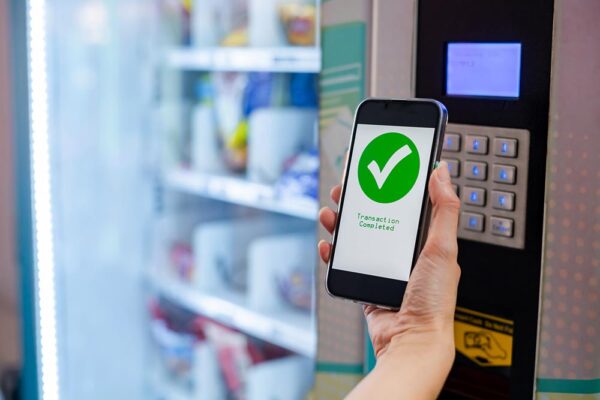The Retail Revolution: Smart Modules for Smart Vending
By Fabrizio Mulas
October 18, 2023
The current IoT market is fast-paced and crowded. As a result, IoT companies are under ongoing pressure to meet evolving needs and anticipate future trends. This is especially true for the smart vending vertical.
Businesses are building new IoT-enabled products and enhancing existing ones. Emerging IoT technologies, such as smart modules, can give companies a competitive advantage.

In addition to light lunches, small apparel items and medicine, smart vending machines offer:
Smart vending machines and kiosks are a staple in train stations and airports, as well as cities in Europe and Asia.
These intelligent, automated retail machines use IoT technology to:
Furthermore, retailers can position intelligent vending machines in high-traffic areas where stores are not accessible, such as beaches or concerts.
Soon, smart vending machines will make precise recommendations to customers using facial recognition capabilities. However, customers may have significant privacy concerns regarding this technology. As such, smart vending companies should prioritize those IoT businesses that are mindful of customer privacy and cybersecurity.
There are three common approaches to IoT device development:
With the chip down approach, IoT companies build their products piece by piece using various chips and components. It costs a lot of time and money and is highly complex. Embedding cellular connectivity with this method is also very lengthy and challenging.
The bill of materials (BOM) with this approach may be less expensive, though fixed costs (e.g., R&D and certifications) must be paid off over time. If you expect your sales to go beyond breaking even, chip down may be the best investment, provided you don’t mind waiting a long time to get to market.
The IoT module approach is far more advantageous than the chip down approach. It’s a prebuilt system that simplifies the development process, decreasing costs and accelerating the time to market. In this approach, a module integrates your design as a regular component. It’s tested and certified as a fully integrated system.
Better still than the IoT module approach is the smart module approach. Smart modules build on the standard IoT module foundation, enabling customer software and multiple applications to run. Like IoT modules, smart modules are tested and certified. They also reduce costs (including the total cost of ownership) and can get your IoT project to market faster.
Read our white paper, “When to Choose an IoT Smart Module for Device Development.”

Smart modules allow device manufacturers to create IoT use cases with touch-scroll-swipe consumer multimedia experiences. They are perfect for smart vending and other verticals like home automation, telematics, and security and surveillance, which are smaller but projected to grow.
Before smart modules, companies had to work with multiple vendors to combine technologies and capabilities to create IoT-enabled devices. Now, all these technologies and capabilities are embedded in smart modules. They simplify the process for the customer and reduce the physical device footprint. In addition, smart modules enable faster time to market without sacrificing performance or capability.
Smart modules offer:
With these features, smart modules enable smart vending machines to provide a richer user experience.
The smart module category is young, which is not to say that it isn’t technically mature or advanced, but that legacy modules have been in the market much longer. Nevertheless, more IoT businesses will adopt this approach as awareness grows.
IoT device manufacturers must navigate complex hardware and software intersections and requirements to meet their smart vending customers’ expectations. Having the right IoT partner can help. Telit Cinterion is uniquely positioned in the smart module market, having expertise in combining hardware and software for many platforms.
Speak with our IoT retail experts today to get started on your smart vending solution.